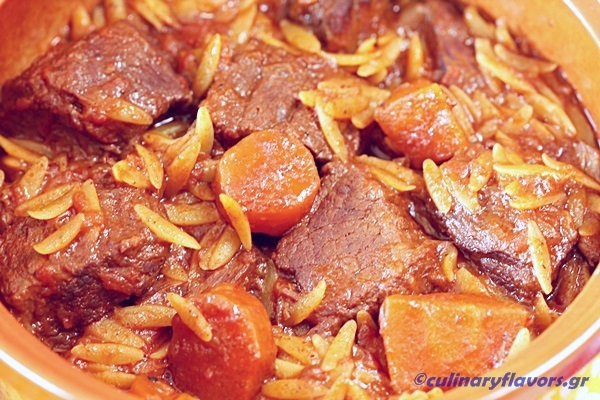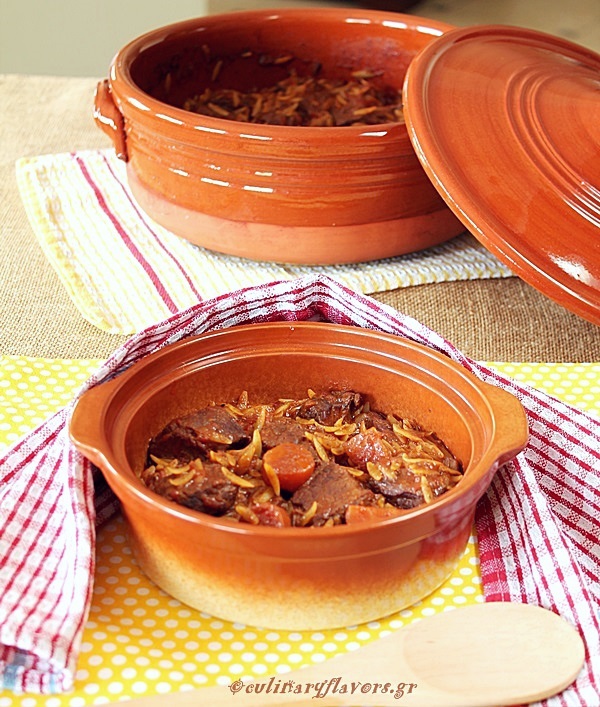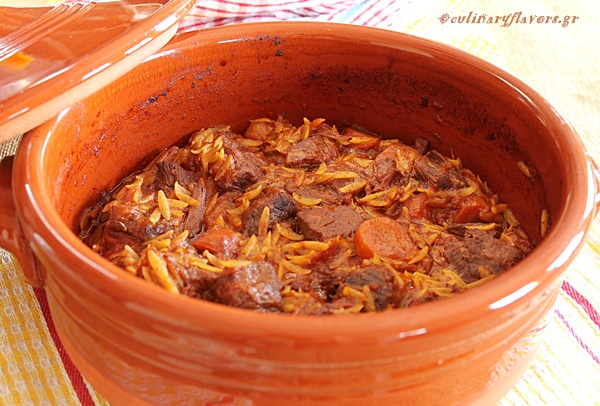Η συνταγή και στα ελληνικά στο τέλος της ανάρτησης!
In the old days, Sundays used to be the family day. Usually, grandparents cooked and invited the rest of the family members to join their Sunday, lunch table. Sons, daughters, grandchildren, uncles, aunts and cousins were gathered around the table, to share not only food but experiences and feelings. I remember my mom doing this, because my grandparents weren’t in such health condition to do it. I was lucky enough to grow up with grandparents and cousins around.
At that moment I couldn’t realize how important those liaisons were to my mental and emotional stability, but as the years go by, I think that growing with all these people and interact with them, gave me a sense of love, compassion and strong family bonds.

This is what it used to happen a lot in the past; nevertheless, not the same thing stands today. As the years pass by, people are less eager to get into the fuss of preparing a lunch for so many people, they are tired from working all week long and they prefer to spend their Sundays in a more relaxed way. So, this informal custom has started to faint and families don’t get together as often as they used to plus the Sunday lunch when it takes place usually involves the closest family members such as grandparents, children and grandchildren. In my opinion this is a drawback of modern society that adds to modern man’s unhappiness and introversion.
One of the things I remember on Sunday’s table was Giouvetsi. As I have told you many times in the past, Greek kitchen has been infused by the Asia Minor kitchen brought here by the Greek refugees who came from Turkey in 1922. You also know that my grandparents were among those people and I grew up eating the very best from both cultures.

Giouvetsi comes from the Turkish word güveç and it was eaten by the Ottomans. Turks usually make it with lamb, we make it with beef. It is a casserole and it is baked in a clay pot like the one I am showing you in my pictures. It is not a difficult dish, on the contrary it is very easy, only it requires a bit of preparation and a few hours of cooking if someone doesn’t use pressure cooker. I cut back on some time and used the pressure cooker which made the procedure less time consuming. It is a pure comfort food, perfect for families and if you don’t have a clay pot you can make it in the slow cooker or in a normal pot or even in a deep pan in the oven.
- 1 kilo / 2 lb. beef in chunks
- ⅔ cup orzo
- 2 carrots, sliced
- 2 onions, chopped
- 400 gr. / 14 oz. tomato sauce
- 1 can beer
- Salt and pepper
- ½ tsp nutmeg
- ½ tsp cinnamon
- ½ tsp ground cloves
- 1 tbsp sugar
- 2 bay leaves
- ⅔ cup water
- Olive oil to sauté the beef
- In your pressure cooker pour the olive oil and sauté in high heat the onion for couple of minutes.
- Add the beef and sauté until it become pale.
- Add the onions, the tomato juice, the beer, salt and pepper and all the spices, sugar and bay leaves.
- Close the lid and follow manufacturer’s instructions.
- In my pressure cook it took 1 ½ hour for the beef to become soft.
- Preheat oven to 200° C / 400° F.
- Take a deep pan or, if you have, a clay pot.
- Add the ⅔ of cup orzo and on top of that the meat with its juices.
- Add the water and mix.
- Place in the oven for about ½ an hour or until the orzo is ready.
- After 15 to 20 minutes check it out it may need some more water.
- Add ¼ of a cup and check again until orzo is done and there are still some juices in the pot.
- Remove from the oven let it cool for 5 minutes and serve.
- 1 κιλό μοσχάρι σε κομμάτια
- ⅔ φλ. κριθαράκι
- 2 καρότα, κομμένα σε φέτες
- 2 κρεμμύδια, ψιλοκομμένα
- 400 γρ. σάλτσα ντομάτας
- 1 κουτάκι μπύρα
- Αλάτι και πιπέρι
- ½ κ.γ. μοσχοκάρυδο
- ½ κ.γ. κανέλα
- ½ κ.γ. γαρύφαλλα
- 1 κ.σ. ζάχαρη
- 2 φύλλα δάφνης
- ⅔ φλ. νερό
- Ελαιόλαδο για να σοτάρουμε το κρέας
- Στη χύτρα ρίξτε το ελαιόλαδο και σοτάρετε σε δυνατή φωτιά το κρεμμύδι για 2 λεπτά.
- Προσθέστε το κρέας και σοτάρετε μέχρι να ασπρίσει.
- Προσθέστε τα κρεμμύδια, το χυμό ντομάτας, την μπύρα, αλάτι και πιπέρι και όλα τα μπαχαρικά, τη ζάχαρη και τα φύλλα δάφνης.
- Κλείστε το καπάκι και ακολουθήστε τις οδηγίες του κατασκευαστή.
- Στη δική μου χύτρα πήρε 1 ½ ώρα για να μαλακώσει το μοσχάρι.
- Προθερμάνετε το φούρνο στους 200° C.
- Πάρτε ένα βαθύ ταψί ή, αν έχετε, ένα πήλινο.
- Προσθέστε τα ⅔ φλιτζάνι κριθαράκι και από πάνω το κρέας με τους χυμούς του.
- Προσθέστε το νερό και ανακατεύουμε.
- Τοποθετήστε στο φούρνο για περίπου ½ μια ώρα ή μέχρι να δέσει το κριθαράκι.
- Μετά από 15 έως 20 λεπτά, ελέγξτε έξω αυτό μπορεί να χρειαστεί λίγο περισσότερο νερό.
- Προσθέστε ¼ της κούπας και ελέγξτε και πάλι έως ότου γίνεται το κριθαράκι και εξακολουθούν να υπάρχουν ορισμένοι χυμοί στην κατσαρόλα.
- Αφαιρέστε από το φούρνο αφήστε το να κρυώσει για 5 λεπτά και σερβίρετε.


